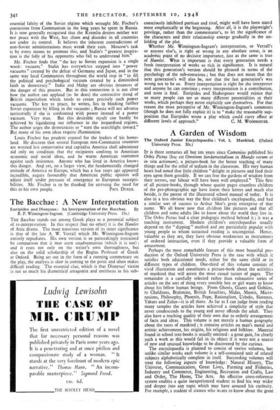The Bacchae : A New Interpretation
Euripides and Dionysus : An Interpretation of the Bacchae. By R. P. Winnington-Ingram. (Cambridge University Press. 15s.)
THE Bacchae stands out among Greek plays as a perennial subject of re-interpretation. In this respect (but no other) it is the Hamlet of Attic drama. The most notorious version of its inner significance is that of the late A. W. Verrall which Mr. Winnington-Ingram entirely repudiates. His own version is so painstakingly restrained by comparison that it may seem unadventurous (which it is not) ; and it rests not only on the writer's own thoroughness, but also on the solid scholarship of the Regius Professor of Greek at Oxford. Being set out in the form of a running commentary on the play, the analysis is slow in coming to the point and often makes difficult reading. The essential clue, which is that Dionysus' victim is not so much his diametrical antagonist and antithesis as his sub-
consciously inhibited partisan and rival, might well have been stated more emphatically at the beginning. After all, it is the playwright's privilege, rather than the commentator's, to let the significance of the characters and their relationship emerge gradually in the un- folding of the plot.
Whether Mr. Winnington-Ingram's interpretation, or Verrall's or anyone else's, is right or wrong in any absolute sense, is an academic point of no decisive importance, just as the same is true of Hamlet. What is important is that every generation needs a fresh interpretation of works so rich in significance. It is natural that this generation's version should be phrased in terms of the psychology of the sub-conscious ; but that does not mean that the next generation's will also be, nor that the last generation's was wrong not to be so. Every interpretation is right for the interpreter and anyone he can convince ; every interpretation is a contribution, and none is final. Euripides and Shakespeare would rejoice that so many people can see so many different potentialities in their works, which perhaps they never explicitly saw themselves. For that reason the most perceptive of Mr. Winnington-Ingram's comments (though he does not fully exploit it) is to " make the reasonable sup- position that Euripides wrote a play which could carry effect at


































 Previous page
Previous page